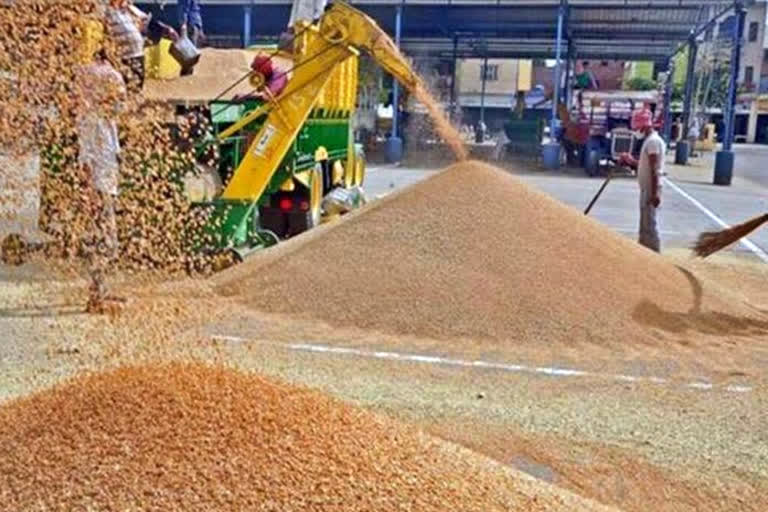New Delhi: India and five central Asian countries on Tuesday asserted that Afghani soil must not be used for any terrorist activities even as New Delhi announced a fresh tranche of 20,000 metric tonnes of wheat to Afghanistan which will be sent through the Chabahar Port in Iran. The first meeting of the India-Central Asia joint working group on Afghanistan in New Delhi also witnessed a resolve by the participating countries exploring ways to jointly counter threats of terrorism, extremism, radicalisation and drug trafficking in the region.
A joint statement said the meeting emphasized the importance of formation of a "truly inclusive and representative political structure" that respects the rights of all Afghans and ensures equal rights of women, girls and members of minority groups, including access to education. In December, India joined several other leading countries in criticising the Taliban's decision to ban university education for women in Afghanistan, The joint statement said India announced the supply of 20,000 metric tonnes of wheat assistance to Afghanistan in partnership with UN World Food Programme through Chabahar Port.
Months after the Taliban captured power in Kabul in August 2021, India had announced an assistance of 50,000 metric tonnes of wheat to Afghan people as they were reeling under a severe food crisis. Subsequently, the consignments were sent to Afghanistan using the land route through Pakistan. Islamabad had granted the transit facility after months of discussions. The joint statement said the officials at the deliberations discussed regional threats of terrorism, extremism, radicalisation and drug trafficking and also deliberated on the possibilities to coordinate efforts to counter these threats.
It said they emphasised that the "territory of Afghanistan should not be used for sheltering, training, planning or financing any terrorist acts and reaffirmed that no terrorist organizations including those designated by the UNSC resolution 1267 should be provided sanctuary or allowed to use the territory of Afghanistan". Besides host India, the meeting was attended by special envoys or senior officials of the Kazakhstan, Kyrgyz Republic, Tajikistan, Turkmenistan and Uzbekistan. Country representatives of the UN Office on Drugs and Crimes (UNODC) and UN World Food Programme (UNWFP) also participated in the meeting.
The joint statement said the officials exchanged views on the current situation in Afghanistan, including the political, security and the humanitarian aspects. "While emphasising the respect for sovereignty, unity and territorial integrity and non-interference in its internal affairs, the sides reiterated support for a peaceful, secure and stable Afghanistan," it said. It said the country representative of the UNWFP in Afghanistan briefed the participants on the India-UNWFP partnership to deliver foodgrain assistance to Afghan people and made a presentation on the current humanitarian situation, including the aid requirements for the year ahead.
"The sides took note of the current humanitarian situation and agreed to continue to provide humanitarian assistance to the Afghan people," the statement said. It said the country representative of the UNODC in Afghanistan highlighted the partnership of India and UNODC in fighting the menace of narcotics in Afghanistan and thanked New Delhi for "providing humanitarian aid for the Afghan drug user population." "Upon their request, India offered capacity building training courses for the relevant stakeholders/partner agencies of UNODC and the relevant officials/stakeholders of Central Asian Republics in the field of countering illegal drug trafficking," the statement said.
Moreover, India and UNODC also agreed to partner for the efforts to counter drug trafficking, including the efforts for rehabilitation of Afghan drug user population, especially the Afghan women and providing assistance in development of alternate livelihood opportunities, a press statement by the Ministry of External Affairs said.
The joint statement said the participants thanked India for holding the first Joint Working Group Meeting on Afghanistan at senior officials level and agreed to continue consultations in this format on a regular basis. India has not yet recognised the Taliban regime in Afghanistan and has been pitching for the formation of a truly inclusive government in Kabul besides insisting that Afghan soil must not be used for any terrorist activities against any country.
India has been pitching for providing unimpeded humanitarian aid to Afghanistan to address the unfolding humanitarian crisis in the country. In June last year, India re-established its diplomatic presence in Kabul by deploying a "technical team" in its embassy in the Afghan capital. India had withdrawn its officials from the embassy after the Taliban seized power in August 2021 following concerns over their security. (PTI)
